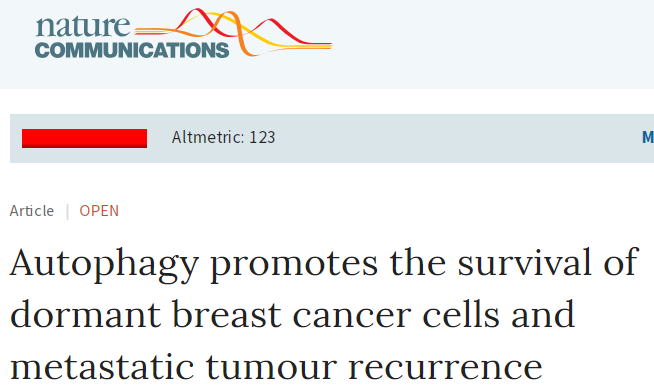Release date: 2018-05-24 The results were published in the journal Nature Communications on the topic of "Autophagy promotes the survival of dormant breast cancer cells and metastatic tumour recurrence", which provides a promising goal for breast cancer treatment. DOI: 10.1038/s41467-018-04070-6 When the disease is transferred to other organs or parts of the body, it can cause about 90% of breast cancer patients to die. Scientists have been working to understand how cancer cells are hidden (sometimes even hidden for decades) and what triggers their reawakening. Kent Hunter, a research author and author of the National Cancer Institute (NCI) in Maryland, said: "Our findings demonstrate that breast cancer cells can pass through a cellular process called autophagy. The patient has survived for a long time." Autophagy occurs in any healthy or cancerous cell. To survive, these cells reorganize internal components to adapt to stress and malnutrition. This allows the cells to partially shut down and enter a state similar to hibernation. Three-dimensional culture of human breast cancer cells, DNA staining is blue, and protein on the cell membrane is stained green. Image source: NIH Hidden cells According to Hunter, many traditional anticancer drugs are designed for dividing cells, however, dormant cells do not actively or frequently divide. In addition, dormant cells are hidden elsewhere in the body, which helps them escape local treatments such as radiation. In the first experiment of the study, researchers led by Hunter colleague Laura Vera-Ramirez injected dormant breast cancer cells into mice. Of these, half of the animals were given drugs that inhibit autophagy, while the other half used a placebo or "dummy" drug; in the second experiment, they changed the genes that control autophagy. It was found that these two methods "significantly" reduce the survival rate of cancer cells and limit the spread of cancer cells. In the absence of autophagy, cancer cells accumulate toxic substances and damage their own mitochondria (the cell's energy production unit). The researchers believe that these findings help explain why current treatments often fail to eradicate breast cancer cells. “The path to finding a viable treatment is still long. Clinical trials are needed to determine if the treatment is effective for human patients. On the other hand, it is unclear whether these findings are applicable to other types of cancer,†concludes Hunter. Reference materials: Scientists discover how breast cancer hibernates: study Source: Bio-Exploration Wenzhou Celecare Medical Instruments Co.,Ltd , https://www.celecaremed.com
